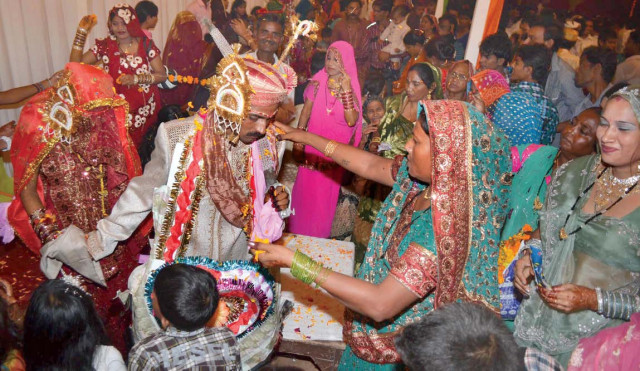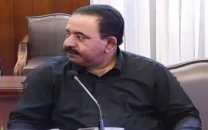Fighting for rights: Hindu Marriage Act might be ready in two months
There are no specific marriage laws for Hindus and Sikhs in the country.

Good news for all the couples who would otherwise be off the books: The Hindu Marriage Act will be approved within two months, promised MNA Kishan Chand Parwani on Saturday.
The announcement came during a meeting organised by the Human Rights Commission of Pakistan to discuss issues for people of non-Muslim faiths. Although the bill is still pending in the National Assembly, it still represents a ray of hope for Hindus, Sikhs and people of other faiths.
Since June 2010, the HRCP has been holding sessions. The fourth session was held at Hotel Regent Plaza.
While talking to The Express Tribune, a Sikh leader from Peshawar, Charanjeet Singh, said that if the government approved the Hindu Marriage Act, it would be a milestone for other minorities, especially since the Hindu community was the largest minority in the country. This would then encourage them and other groups to propose further amendments with reference to their religion.
According to Parwani, the Hindu Marriage Act was drafted by Advocate Jhamat Mal. He used the Indian Hindu Marriage Act of 1956 as a model to ensure that it was acceptable to the Hindus here. “The clause on divorce was upsetting some Hindu leaders because it is not part of our religious culture,” he said. “However they forgot to consider that it was allowed in the Indian act.” The object of the bill was to provide a special form of marriage and divorce among Hindus - the provision would also be applied to the irretrievable breakdown of a marriage.
According to Advocate Rochi Ram, there were no specific marriage laws for Hindus and Sikhs in Pakistan. Although courts accept proof of a Christian marriage from a priest, there is no such thing for Hindus. There are no laws for inheritance, re-marriage, divorce, separation or adoption. If passed, the law will be applicable for Hindus, Buddhists, Jains and Sikhs.
Elections
For Inder Ahuja, a Hindu representative, change will only come if organisations such as the HRCP change how the religious majority thinks. Zahid Farooq, a Christian representative, was in full agreement. He said that the HRCP should involve major political parties in dialogue to resolve electoral representation.
“Political parties should offer their tickets to candidates to contest on general seats rather than reserved ones,” he said. “This way a joint electoral pattern will become a platform for minority integration within society as Muslims will also be voting for a Christian or Hindu candidate.”
Tahir Mahmood, a representive of the Ahmadi community, said that he resented being part of the non-Muslim category in the current voter registration system. “We demand that our votes should be registered as Ahmadi,” he said.
One of the topics under discussion was how many minorities refused to register for elections for fear of being exposed. Singh said there were no voter registration problems in Peshawar. All 700 Sikh families in the province registered.
Education
Pushpa Kumari, a Hindu rights activist, talked about when her nephews moved to Karachi from Mirpurkhas and were refused admission to a well-known school in Gulshan-e-Iqbal. It refused to let them in because they would not be able to perform ‘wuzu’ and attend Islamiyat lessons. The principal suggested that they might be better off in a convent.
Christian representative Nuzhat Williams claimed that all subjects, including natural and social science subjects had been systematically Islamised as they only highlight achievement of Muslim scientists. Although non-Muslim students have the right to choose between Islamiyat and Ethics, there was no text book or teacher for them.
Jimmy Enginner was there to represent the Parsis. He said that religious minorities should stop labelling themselves as minorities as it marginalised them and took away their right to be recognised as Pakistani citizens.
Published in The Express Tribune, November 13th, 2011.



















COMMENTS
Comments are moderated and generally will be posted if they are on-topic and not abusive.
For more information, please see our Comments FAQ